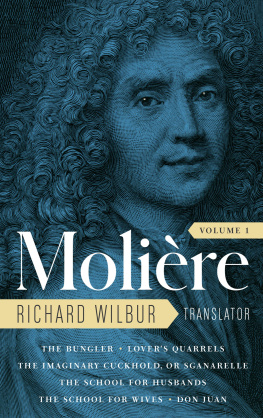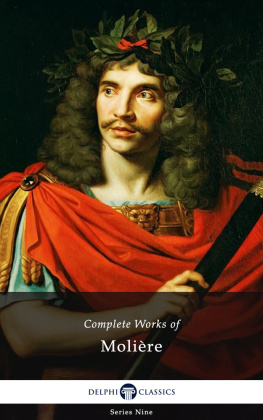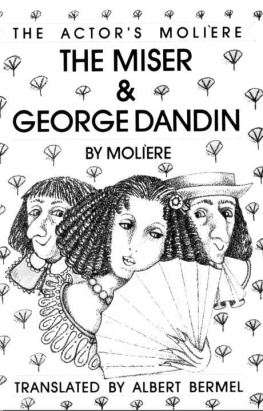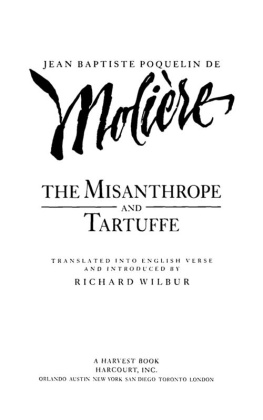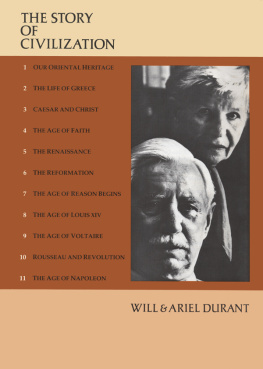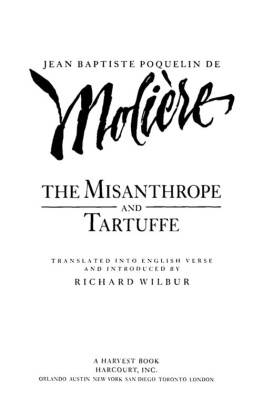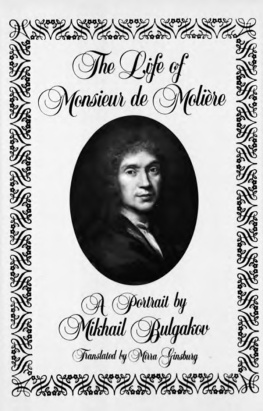Moliere - Moliere: the Complete Richard Wilbur Translations, Volume 1
Here you can read online Moliere - Moliere: the Complete Richard Wilbur Translations, Volume 1 full text of the book (entire story) in english for free. Download pdf and epub, get meaning, cover and reviews about this ebook. year: 2021, publisher: Library of America, genre: Romance novel. Description of the work, (preface) as well as reviews are available. Best literature library LitArk.com created for fans of good reading and offers a wide selection of genres:
Romance novel
Science fiction
Adventure
Detective
Science
History
Home and family
Prose
Art
Politics
Computer
Non-fiction
Religion
Business
Children
Humor
Choose a favorite category and find really read worthwhile books. Enjoy immersion in the world of imagination, feel the emotions of the characters or learn something new for yourself, make an fascinating discovery.
- Book:Moliere: the Complete Richard Wilbur Translations, Volume 1
- Author:
- Publisher:Library of America
- Genre:
- Year:2021
- Rating:4 / 5
- Favourites:Add to favourites
- Your mark:
- 80
- 1
- 2
- 3
- 4
- 5
Moliere: the Complete Richard Wilbur Translations, Volume 1: summary, description and annotation
We offer to read an annotation, description, summary or preface (depends on what the author of the book "Moliere: the Complete Richard Wilbur Translations, Volume 1" wrote himself). If you haven't found the necessary information about the book — write in the comments, we will try to find it.
Moliere: author's other books
Who wrote Moliere: the Complete Richard Wilbur Translations, Volume 1? Find out the surname, the name of the author of the book and a list of all author's works by series.
Moliere: the Complete Richard Wilbur Translations, Volume 1 — read online for free the complete book (whole text) full work
Below is the text of the book, divided by pages. System saving the place of the last page read, allows you to conveniently read the book "Moliere: the Complete Richard Wilbur Translations, Volume 1" online for free, without having to search again every time where you left off. Put a bookmark, and you can go to the page where you finished reading at any time.
Font size:
Interval:
Bookmark:
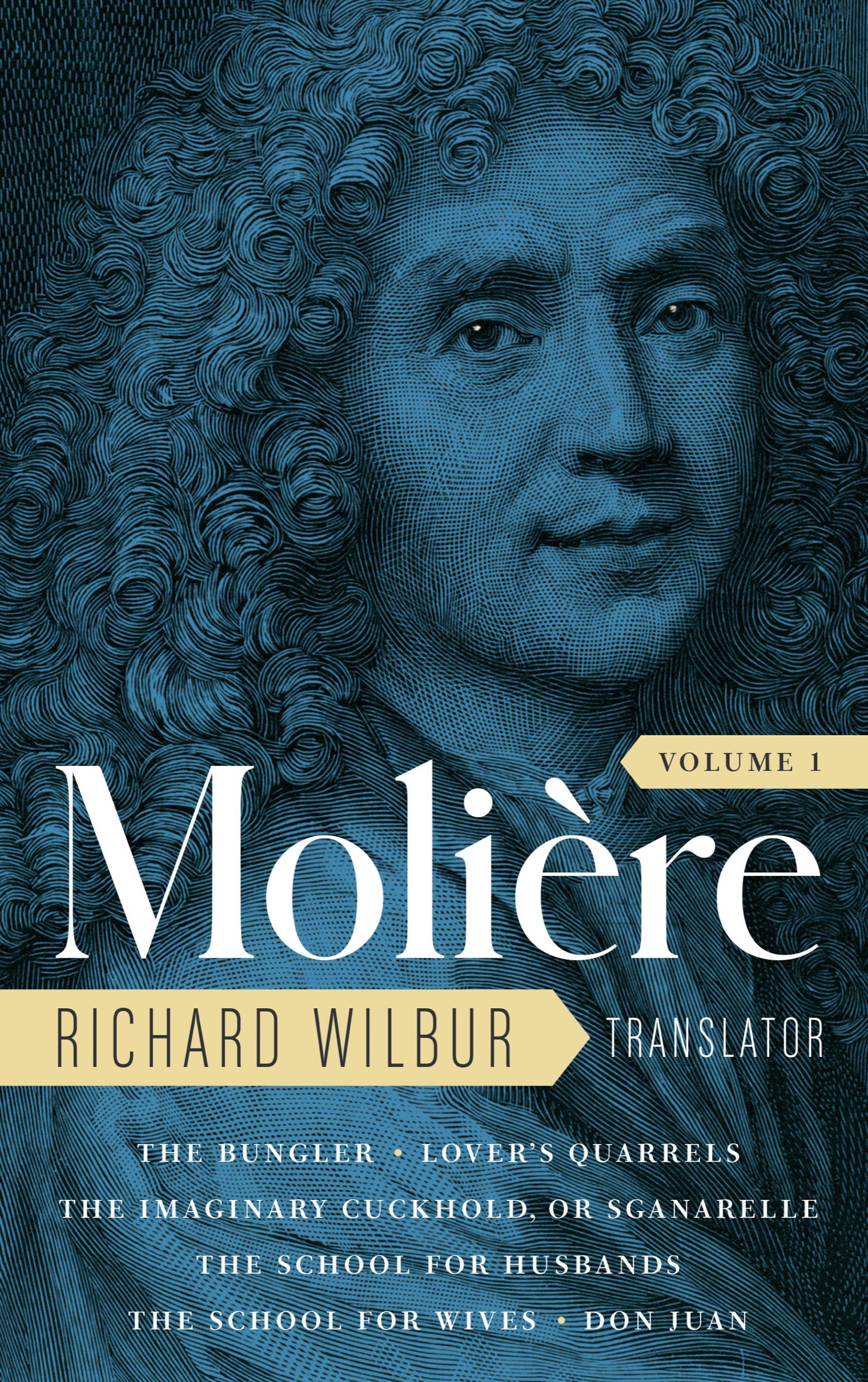
VOLUME 1 Molire
 VOLUME 1 The Bungler Lovers Quarrels Sganarelle, or the Imaginary Cuckold The School for Husbands The School for Wives Don Juan
VOLUME 1 The Bungler Lovers Quarrels Sganarelle, or the Imaginary Cuckold The School for Husbands The School for Wives Don Juan  A LIBRARY OF AMERICA Special Publication MOLIRE: THE COMPLETE RICHARD WILBUR TRANSLATIONS VOLUME 1 Introduction and volume compilation copyright 2021 by
A LIBRARY OF AMERICA Special Publication MOLIRE: THE COMPLETE RICHARD WILBUR TRANSLATIONS VOLUME 1 Introduction and volume compilation copyright 2021 byLiterary Classics of the United States, Inc., New York, N.Y.
All rights reserved. No part of this book may be reproduced in any manner whatsoever
without the permission of the publisher, except in the case of brief
quotations embodied in critical articles and reviews. Published in the United States by Library of America.
Visit our website at www.loa.org. The Bungler , English translation copyright 2010 by Richard Wilbur. Lovers Quarrels , English translation copyright 2009 by Richard Wilbur. Reprinted by arrangement with Theatre Communications Group, Inc.
Sganarelle, or The Imaginary Cuckhold , English translation copyright 1993 by Richard Wilbur. The School for Husbands , English translation copyright 1992 by Richard Wilbur. The School for Wives , English translation copyright 1971, renewed 1999 by Richard Wilbur. Don Juan , English translation copyright 1998, 2001 by Richard Wilbur. Reprinted by arrangement with Houghton Mifflin Harcourt Publishing Company. An Interview with the Translator copyright 2009 by Dana Gioia
and used by permission.
Distributed to the trade in the United States by Penguin Random
House Inc and in Canada by Penguin Random House Canada Ltd. ISBN 9781598537079 eISBN 9781598537116 Molire: The Complete Richard Wilbur Translations
is published and kept in print with support from THE FLORENCE GOULD FOUNDATION Foreword BY A DAM G OPNIK  Indispensable translations mark the intersection, and sometimes the head-on collision, of two sensibilities, and usually two eras. In English, the King James Version of the Bible, most obviously, brings Solomons time and Shakespeares into direct overlap, while Alexander Popes Homer is a still more extreme, inspired collision of archaic Greece and eighteenth-century London. Even Scott Moncrieffs version of Proust, though made close in time to the original, marks a distinct space between the severe French symbolist sounds of Prousts fin de sicle and the somewhat more glossily aestheticized sensibility of the English oneso that Prousts austere title In Search of Lost Time becomes the more self-consciously poetic (and Shakespearean) Remembrance of Things Past . Yet for a translation of a classic to remain impressive in our minds, the original and the new version need somehow to rise from an allied point of view. Some secret concord needs to exist between the two eras for the translation to remain golden.
Indispensable translations mark the intersection, and sometimes the head-on collision, of two sensibilities, and usually two eras. In English, the King James Version of the Bible, most obviously, brings Solomons time and Shakespeares into direct overlap, while Alexander Popes Homer is a still more extreme, inspired collision of archaic Greece and eighteenth-century London. Even Scott Moncrieffs version of Proust, though made close in time to the original, marks a distinct space between the severe French symbolist sounds of Prousts fin de sicle and the somewhat more glossily aestheticized sensibility of the English oneso that Prousts austere title In Search of Lost Time becomes the more self-consciously poetic (and Shakespearean) Remembrance of Things Past . Yet for a translation of a classic to remain impressive in our minds, the original and the new version need somehow to rise from an allied point of view. Some secret concord needs to exist between the two eras for the translation to remain golden.
The King James Bible triumphs because it was translated into English at a time when elaborate metaphoric rhetoric and polysyndeton, extended composition through the simple dignity of ands, were natural to English style. Popes Homer was united with Homers Homer by a shared love in their audiences for large-scale poetic storytelling, and more patience than we have today for long speeches in high diction and endless-seeming lists. The same taste that could put up with all the minor dunces in The Dunciad was necessary to put up with all the lists of ships in The Iliad . No translations mark the intersection of two authors and two ages more strikingly than do Richard Wilburs translations of ten comedies by the seventeenth-century French playwright Molire (16221673). Wilburs first translation, The Misanthrope , published in 1955, was soon followed by his Tartuffe in 1963, with the last, Lovers Quarrels , appearing more than a half century later, in 2009. All are now collected here by Library of America in two volumes.
Miraculously theatrical in ways that more academic translations are not, Wilburs Molire is nonetheless miraculously authentic to the original, written in a flowing, vigilantly smooth version of Molires rhyming couplets, instead of in the lumpy prose of previous English translations. At once readable and stage-friendly, his translations achieve the improbable end of making seventeenth-century French prosody completely playable in English, while remaining true to the essentials of French grand sicle style. Wilbur took Molires Alexandrines, the eleven-syllable rhymed line of classic French theatre and turned it into a more English-friendly iambic pentameter, the ten-syllable heroic couplet of Pope. To do this, he drew on living resources in the American language of his time, particularly on the reality that American ears had become accustomed, both in the then-booming business of light verse and in ambitious musical theaterof which Wilbur himself was to write a supreme example in his lyrics for Leonard Bernsteins Candide to accepting easy rhyme as an aid to emotion. Well, a better playwright than Molire does not exist, and a better translation of a great writers plays does not existbut though that is nearly that , all that need be said, it is not quite that. The intersection of author and translator is something far more than a library or even a theatrical triumph.
The overlap between Wilbur and Molire is social as much as stylistic. To put it simplyor perhaps to state it as simply as a complicated case can be putthough Molire made his life in and around courts, his role was to become the first great comic poet of the emerging and ascendant middle classes, portraying their domestic concentrations, their appetite for erudition, their constant insecurities, and their easy readiness to be wowed by fashions and trends. Wilbur came to Molire at a moment when that same bourgeoise in America was newly ascendant in another waywhen a highly educated postwar GI culture had taken happy possession of a European cultural heritage then undermined on its own ground, a time when all the heritage of European culture seemed in need of American succor and American support. Clive James recalled a Wilbur visit to London in 1962, the height of the period, as offering the epitome of cool... somehow it seemed plausible that the traditional high culture of Europe should be represented... by an American who looked like a jet jockey....
The internationalization of a mind like Wilburs, its seemingly relaxed roaming in the European tradition, fitted the picture perfectly. James, writing in 1972, felt obliged to dilute his admiration with a tincture of derision; later on, he would have muted the tone. But the basic picture is sound; much of the confidence and optimism of that postwar epoch is still caught, however improbably, in Wilburs translations. Wilburs Molire lives both as masterpieces of the translators art and as witness to a hopeful (and still not quite finished) American moment. Wilbur tells us that he had first come upon the idea of translating Molire in 1948, when he saw a production of Cyrano at the Comdie-Franaise. (Two great American art historians of Picasso and Rodin respectively, William Rubin and Albert Elsen, would recall in later life how they met on a troopship leaving New York, when they were the only soldiers too aesthetically fastidious to rush to the other side of the deck to look at the Statue of Liberty.) This European education could take very odd forms indeed. (Two great American art historians of Picasso and Rodin respectively, William Rubin and Albert Elsen, would recall in later life how they met on a troopship leaving New York, when they were the only soldiers too aesthetically fastidious to rush to the other side of the deck to look at the Statue of Liberty.) This European education could take very odd forms indeed.
Font size:
Interval:
Bookmark:
Similar books «Moliere: the Complete Richard Wilbur Translations, Volume 1»
Look at similar books to Moliere: the Complete Richard Wilbur Translations, Volume 1. We have selected literature similar in name and meaning in the hope of providing readers with more options to find new, interesting, not yet read works.
Discussion, reviews of the book Moliere: the Complete Richard Wilbur Translations, Volume 1 and just readers' own opinions. Leave your comments, write what you think about the work, its meaning or the main characters. Specify what exactly you liked and what you didn't like, and why you think so.

